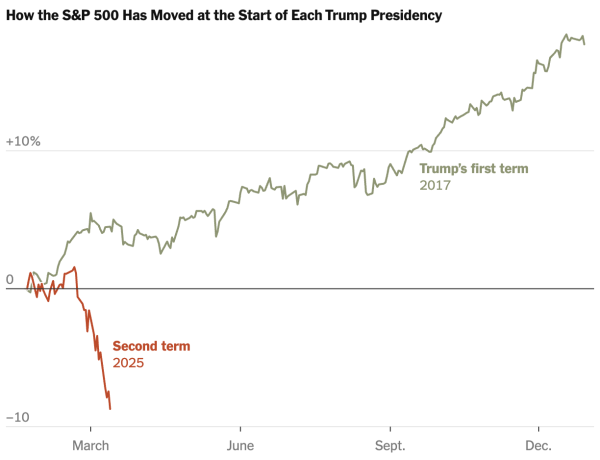With the transition of power from a democratic white house with former President Biden to an entirely republican-controlled administration under President Trump, the United States has seen political change in the past few months like never before. This article aims to summarize the main political events that have occurred recently, so people can stay informed on what is currently going on in the American political landscape.
The Economy
From his 2018 presidency to his last campaign, Trump has always been fond of tariffs. He maintained his plan to put tariffs on China, and after a 30 day pause on tariffs on Canada and Mexico, the tariffs are once again active. In response, China, Canada, and Mexico have enacted retaliatory tariffs of their own, as well as boycotting and taking American-made goods off the shelves, such as certain brands of liquor and alcohol. What is the true effect that these tariffs will have on the economy? It is too early to tell, but many economists attribute our plummeting stock market as a response to the economic stress these tariffs have placed on the economy. Major stock indexes have fallen sharply including the S&P 500, Nasdaq and the Russell 2000. This is indicative of a ‘correction period,’ a Wall Street term referring to a 10% decline from an index’s last peek. This steep drop is relatively rare and worrisome as economists prepare for the worst with Trump’s controversial tariffs.
Foreign Policy
Trump’s decisions regarding tariffs and other policies, such as withdrawing from the Paris Climate Agreement, have increased tensions with many countries, most of which the U.S. has historically called allies. Another key aspect of foreign policy is Trump’s complicated relations with President Zelensky of Ukraine and President Putin of Russia. On February 28, Trump and Zelensky met for a televised meeting in the White House’s Oval Office. The focus was to secure Ukraine’s approval of signing mineral rights over to the United States in exchange for the U.S.’s foreign aid supply to Ukraine. The meeting resulted in nothing signed, with tensions in the countries’ already-strained relationship exacerbated. Some of the disagreements likely stemmed from President Trump’s support of Russian President Putin, his placing blame on Ukraine for starting the war, and his judgment of President Zelensky’s military style clothing as a sign of solidarity to Ukrainian soldiers. Just a few weeks later, Ukraine has accepted the mineral deal with the U.S. in exchange for a 30-day ceasefire, which is currently awaiting approval from Putin before implementation. Putin, in response, agreed to stop attacking Ukrainian energy facilities but refused to endorse the full 30-day ceasefire.
DOGE and Mass Job Cuts
One of Trump’s main actions thus far as president has pertained to the creation of The Department of Government Efficiency (DOGE), led by Elon Musk. His goal for the department is to drastically reduce the size and scope of the federal government by cutting departments within the organization. This has manifested itself in large scale job cuts across many governmental agencies and budget reductions. This is made increasingly evident with the Department of Veterans Affairs setting a target to reduce the number of employees by 80,000, the Department of Education moving to get rid of half of its workforce, and the Social Security Administration offering buyouts to reduce employee size. These budget and job cuts through DOGE are just the beginning of the new administration’s mass effort to shut down federal spending in areas the president no longer believes to be necessary or beneficial. The Trump administration states the changes will increase governmental productivity, but as DOGE continues with their scheduled job and funding reductions, it is unclear what the long term effect will be.
Diversity, Equity and Inclusion
President Trump issued an executive order to end “Diversity, Equity, and Inclusion” policies just hours after taking office, and directed federal agencies to compile lists of companies that could be investigated for now “illegal DEI discrimination.” This has led to many notable companies like Facebook, Instagram, Google, Disney, and many others removing or substantially reducing their guidelines around maintaining ‘Diversity, Equity and Inclusion.” These policy changes have increased tension around an already polarizing issue. Critics of DEI policy say DEI focuses on race and gender at the expense of individual merit, while supporters have angrily responded that DEI is highly beneficial to the success of companies through boosting innovation and profits as well as encouraging companies to be more welcoming to people from marginalized backgrounds. “Diversity, Equity and Inclusion” is a statement used all across America, but its meaning is highly disputed, leading to many arguments around what it should represent in American society today.
Cabinet Approvals
Despite early resistance from Democratic and some Republican Senators, almost all of Trump’s cabinet picks have been quickly confirmed. Surprisingly, his appointees have been confirmed faster this term than during Biden’s presidency and Trump’s first term. So far, twenty-one cabinet members have been confirmed, with the only vote not yet held being for U.S. Ambassador Elise Stefanik. Two key controversial approvals have been Trump’s appointments for U.S. Secretary of Health and U.S. Secretary of Defense. Robert F. Kennedy Jr., during his hearing for Secretary of Health and Human Services, aimed to distance himself from his previous stance against vaccines, eventually being confirmed with all but one of the 53 Republicans voting for him, just enough to get approved. Pete Hegseth’s confirmation as Defence Secretary has sparked more controversy around the former Fox News host amid accusations of excessive drinking and sexual assault. In comparison, Marco Rubio was able to strike a very different chord during his hearing with the Senate Committee on Foreign Relations and received approval from all 99 present Senators to become the new Secretary of State.
Naturalized Citizenship
Another disputed policy that Trump is attempting to construct is the end of birthright citizenship. One of his first acts in office was to sign an Executive Order seeking to deny citizenship to the children of people who are either in the US illegally or on temporary visas. This policy is deeply divisive not only due to its content but its implementation; most legal scholars dispute Trump’s power to change law in this area through an Executive Order, and instead argue the power lies within the courts. Naturalized citizenship is a policy stemming from the 14th Amendment and, although the wording of the amendment creates ambivalence, it has historically been interpreted by the courts to include anyone born on American soil.
Other Substantial Events
One of Trump’s first official acts as President was to grant extensive pardons to all the rioters charged with the January 6th attack on the Capitol. Many of the individuals pardoned have extensive criminal records including, but not limited to, sexual abuse, manslaughter, and drug trafficking.
The most recent news headlines chronicle March 14th when the Senate narrowly prevented a government shutdown, able to finally pass a near party line vote for the Republican created spending bill which funds the government through September. The 54-46 vote was controversial, with the minority leader and nine other Democrats splitting away from the party to vote in favor of the bill. The split within the Democratic party is coming at a time when the group is struggling to maintain a unified voice against today’s entirely Republican controlled government. How the two parties continue to interact and develop within the coming years will be interesting, especially during a presidency which is creating several controversial policies, making history in many ways.




